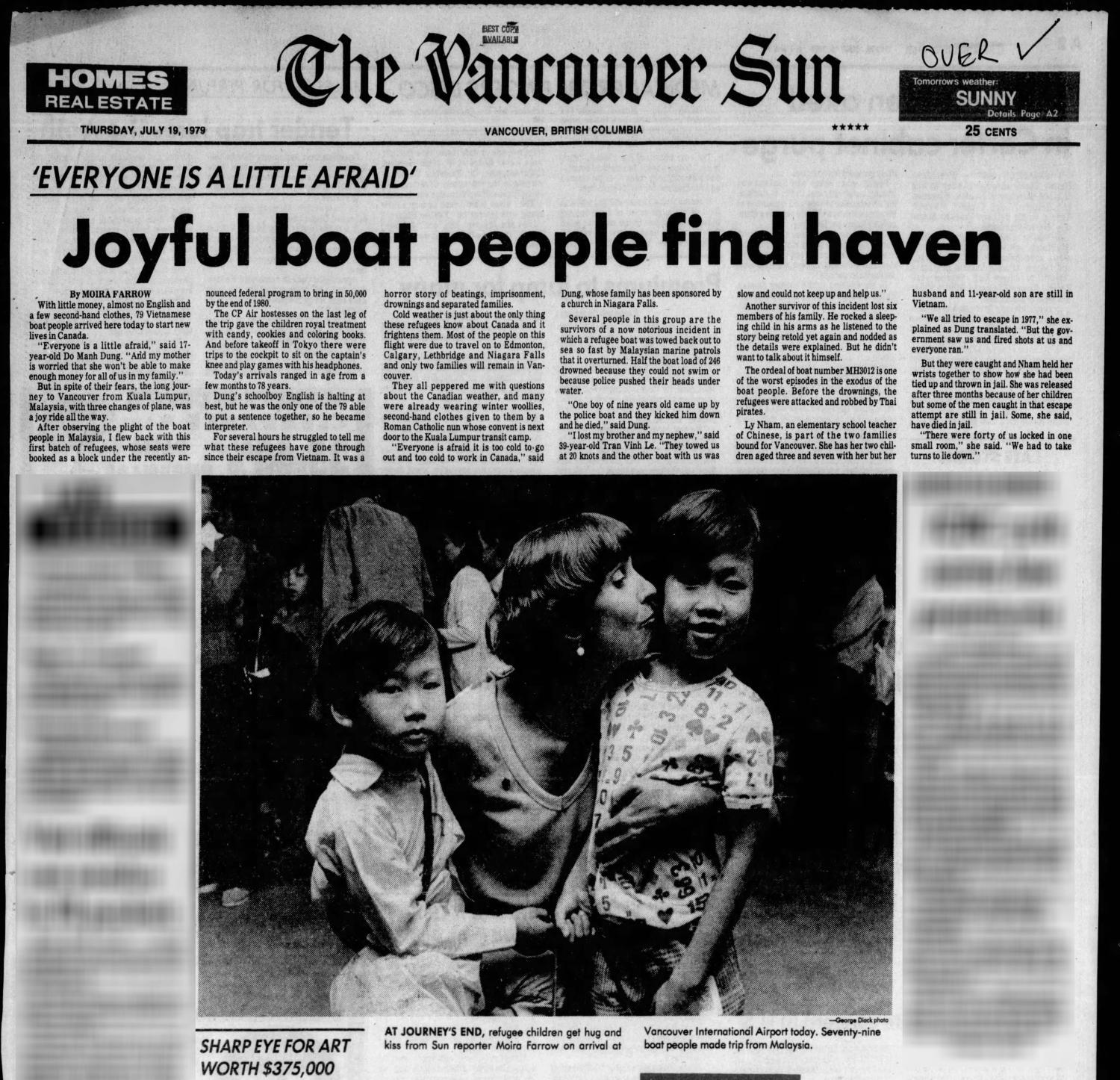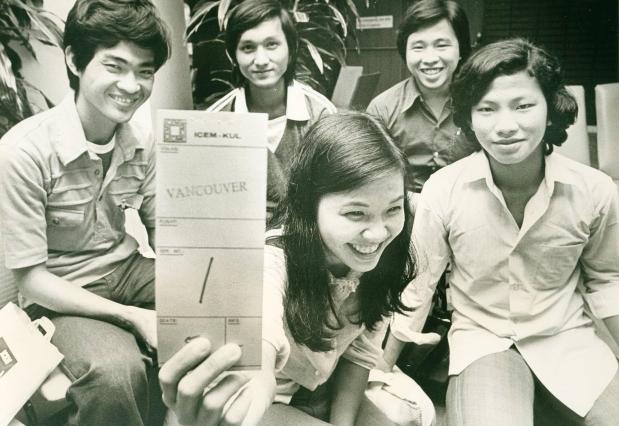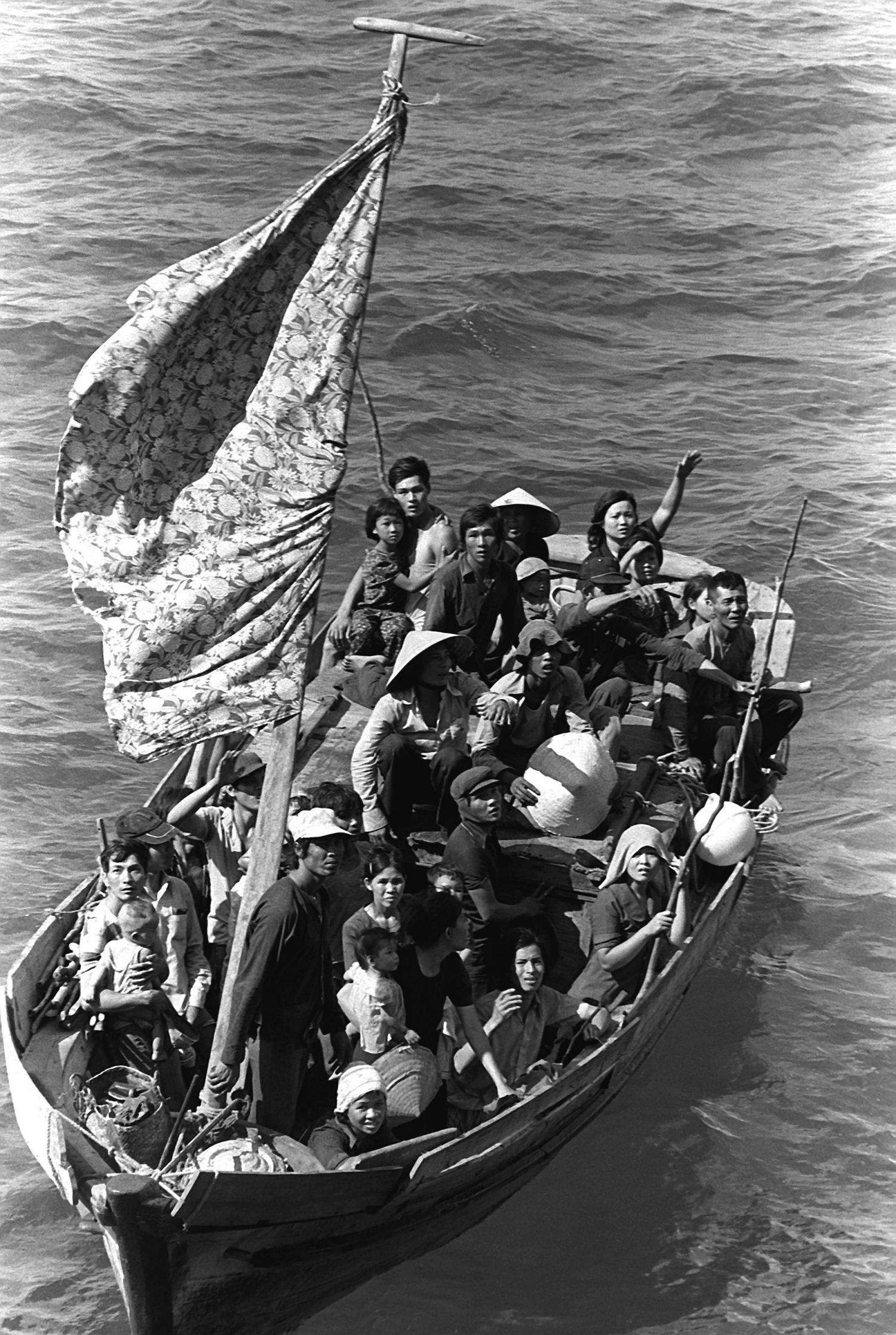Vietnamese Refugees Arrive
Thanks to private sponsors, thousands make B.C. their new home
Date: 1979
The Fall of Saigon in April 1975 ended the Vietnam War. But it created another humanitarian crisis in its wake. In the years that followed, close to a million people — many fearing persecution for their past support of the United States or South Vietnam — fled the war-ravaged country in search of safer harbours. Most travelled on overcrowded boats to neighbouring countries like Thailand or Malaysia, enduring harrowing journeys marked by murder, rape and kidnapping.
“The reports are the most horrifying I have seen,” said United Nations High Commissioner for Refugees Poul Hartling in 1984. “They tell of cruelty, brutality and inhumanity that go beyond my imagination.” Dehydration, starvation and illness were also commonplace. The U.N. estimates that up to 250,000 so-called “boat people” from Vietnam, Cambodia and Laos, sometimes referred to as Indochina, died at sea.
Soon after the war ended, the first wave of Vietnamese refugees, most from the country’s middle class, began to slowly arrive in Canada. In 1976, the Canadian government introduced a new immigration act that recognized refugees as a distinct class of immigrants for the first time ever. The progressive legislation came into effect in the spring of 1978. A year later, the federal government promised to dramatically accelerate its acceptance of Indochinese refugees, with 50,000 resettled in Canada by the end of the year. Another 10,000 people arrived the following year. By 1981, Canada had taken in more Vietnamese and Cambodian refugees than any other country, per capita.
This was made possible through the generosity of ordinary Canadians. For the first time in Canada’s history, the federal government relied on private sponsorship to support refugees in their new home. Roughly 7,000 different groups — churches, charities, families, community associations — sponsored more than half of the Vietnamese refugees who came to Canada between 1979 and 1980. The United Nations later awarded the people of Canada the Nansen Medal, the highest distinction bestowed by the U.N. for aid to refugees.
About 7,500 refugees from the second wave settled in British Columbia. Many of these new arrivals were merchants. At home, their professions made them a potential target of the communist government. But in Canada’s market-based economy, they were success stories. In Vancouver, many Vietnamese newcomers carved out new lives in the Kensington-Cedar Cottage neighbourhood along Kingsway Street. Known for its Vietnamese cuisine, Vancouver recently designated this area “Little Saigon.” The tremendous success Vietnamese refugees have created for themselves, often as self-employed entrepreneurs, proved that the acceptance of large numbers of refugees isn't necessarily a long-term economic burden, as some critics have argued.
Canada’s grassroots program to safeguard tens of thousands of Indochinese refugees is also a story of redemption. For decades, the country’s leaders strove to maintain a “white Canada” through racist immigration policies, according to UBC history professor Henry Yu. While the federal government tossed out the last of its racist immigration laws in 1967, Canada's response to the Indochinese refugee crisis showed that not only had the government become more welcoming of people who may not look like them, but the broader public was trending that direction as well.
Sources:
1. Bauder, Harald. The Promise of Migration: A Companion to the International Metropolis Conference 2019. Ryerson University, 2019, www.ryerson.ca/content/dam/graduate/programs/immigration/documents/Promise_of_Migration.pdf.
2. Farrow, Moira. 'Everyone Is a Little Afraid': Joyful Boat People Find Haven. The Vancouver Sun, 19 July 1979, www.newspapers.com/image/493124140/?terms=vietnam+boat+people+vancouver+sun&match=1.
3. Hou, Feng. The Resettlement of Vietnamese Refugees across Canada over Three Decades. Journal of Ethnic and Migration Studies, 12 Sept. 2020, www.tandfonline.com/doi/full/10.1080/1369183X.2020.1724412.
4. Immigration Act, 1976. Canadian Museum of Immigration at Pier 21, pier21.ca/research/immigration-history/immigration-act-1976.
5. Joy, Amanda. Vietnamese Canadians. The Canadian Encyclopedia, 10 Aug. 2010, www.thecanadianencyclopedia.ca/en/article/vietnamese.
6. Kamm, Henry. Vietnam Refugees Face An Increasing Savagery. The New York Times, 4 July 1984, www.nytimes.com/1984/07/04/world/vietnam-refugees-face-an-increasing-savagery.html.
7. Lambert, Maude-Emmanuelle. Canadian Response to the "Boat People" Refugee Crisis. The Canadian Encyclopedia, 5 July 2017, www.thecanadianencyclopedia.ca/en/article/canadian-response-to-boat-people-refugee-crisis.
8. Luke, Paul, and Dan Fumano. Vietnam's Boat People: How Four Families Found Refuge in B.C. The Province, 3 Oct. 2015, theprovince.com/news/b.c./vietnams-boat-people-how-four-families-found-refuge-in-bc.
9. McQuigge, Michelle. Vietnamese 'Boat People' Focus of New Heritage Minute. The Canadian Press, 20 June 2017, globalnews.ca/news/3541403/vietnamese-boat-people-heritage-minute/.
10. Szeto, Eric, et al. How a Special Program to Resettle Vietnamese Boat People Revealed Flaws in Canada's Immigration System. CBC News, 10 Oct. 2019, www.cbc.ca/news/canada/vietnamese-boat-people-resettlement-program-1.5278953.
11. Thanh Thuy, Vu. “'Boat People' Defeat Sea, but All at Visa Wall.” San Diego Union, 20 July 1986, nl.newsbank.com/nl-search/we/Archives?p_product=SDUB&p_theme=sdub&p_action=search&p_maxdocs=200&s_dispstring=vietnamese%20AND%20date(7/20/1986%20to%207/21/1986)&p_field_date-0=YMD_date&p_params_date-0=date:B,E&p_text_date-0=7/20/1986%20to%207/21/1986)&p_field_advanced-0=&p_text_advanced-0=(vietnamese)&xcal_numdocs=20&p_perpage=10&p_sort=YMD_date:D&xcal_useweights=no.
12. U.N. Awards Medal to Canada for Its Contributions to Cause of Refugees. Reuters, 7 Oct. 1986, www.latimes.com/archives/la-xpm-1986-10-07-mn-5066-story.html.
13. Valpy, Michael. Strangers by Sea: A Tale of Canada's Boat People. The Globe and Mail, 13 Aug. 2010, www.theglobeandmail.com/news/politics/strangers-by-sea-a-tale-of-canadas-boat-people/article1377063/.




